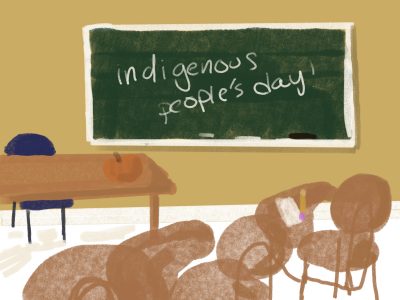Amid heartfelt celebration of the third nationally-recognized Indigenous Peoples’ Day, there remain concerns that the new holiday won’t address any needs of actual indigenous peoples, who remain severely oppressed.
Today, according to the American Bar Association, more than one in four people with indigenous ancestry live in poverty, the highest of any racial group. Most reservations, the last vestiges of indigenous sovereignty, are systematically neglected by the federal government, economically undeveloped and plagued by perpetually high unemployment, overcrowding and other social ills inextricably linked to the history of western expansion.

To say citizens of the United States have a complicated relationship with their nation’s history is a gross understatement. At some point in their lives, reconciling pride in one’s country and the values it purportedly represents with all the suffering that country’s creation required is a task for all Americans.
For many, the mythology of American Exceptionalism makes the point moot, settler colonialism becomes our manifest destiny, and all the sins of our forefathers have been absolved long ago. Dwelling on the past, they say, will only divide us in the present.
As a nation, however, significant strides have been made toward coming to terms with some of our story’s darkest chapters and the systemic injustices they left behind. Within living memory people of all races, genders and identities fought hard to create the more equal and tolerant society in which we live.
That progress has been derided by various monikers such as “political correctness” and “wokeism,” but not all who criticize “identity politics” are conservatives. Leftward criticism points out that contemporary social justice movements are often spontaneous and vague and lack the organization to make “real” change in the “real” world.
For example, at the height Black Lives Matter movement in 2020, certain social media trends such as changing your profile picture or posting a black square were accused of being performative and more about virtue signaling than combating police brutality.
And today, Indigenous Peoples’ Day as well as other in vogue forms of reconciliation such as land acknowledgements, seem to some to be the pinnacle of performativity, renaming a holiday from that of a genocider to his victims and quite literally acknowledging past atrocities while doing nothing to compensate those living with their legacies.
This view lacks imagination. “Performativity” is bad insofar that people who don’t hold convictions as deeply as they say they do are more likely to engage in the realm of ideas because that is easier than taking action.
Even so, virtue signaling still signals the virtuosity of ideas. Even if Black Lives Matter did not actually “defund the police,” the movement had an indelible effect on our collective consciousness that each insignificant post, like and share helped create.
Awareness is a prerequisite for action, and today the U.S. citizenry’s awareness of the indigenous peoples ongoing struggle is so abysmal that almost any activism, no matter how performative, should be welcomed.
Reclaiming Native Truth, a 2018 research initiative, surveyed 13,306 U.S citizens and scoured 4.9 million social media posts to assess what narratives Americans hold about their country’s indigenous inhabitants.
Research showed that Americans are largely ignorant about indigenous peoples, their history and the systemic issues faced by their communities. Outdated and offensive narratives such as “the noble savage” or the ignoble one, still predominate.
One of the most pervasive beliefs was that there are very few indigenous people left, or that they’re dwindling to nonexistence, as opposed to 9.7 million Americans today with partial to full indigenous ancestry, increasing at a faster rate than the general population.
Reclaiming Native Truth also found that public school curricula in 27 states did not mention any individual indigenous persons, and that 87% contained no history about indigenous peoples post-1900, which precludes instruction about the decades-long and ongoing indigenous civil rights movement that began in the 1960s and the blatantly genocidal practices of the U.S. government, such as forced sterilization and the removal of children, which continued well into the 1970s.
So long as such profound pervasive ignorance about indigenous peoples and their history persist, the kind of mass movement required to make “real” change will fail to materialize.
That’s why consciousness-raising efforts such as Indigenous Peoples’ Day should be seen as an important first step of many toward making amends for past and present wrongdoings.
Attempting to be more radical-than-thou by criticizing gestures such as land acknowledgements and Indigenous People’s Day as performative only echoes conservative arguments portraying all forms of social justice as bad faith, and all activism as whiny, lazy and inconsequential.
Indigenous People’s Day isn’t getting anyone their land back, but no one really thinks that either. Instead, in the next generation every child will grow up knowing they get a day off from school every year because of Indigenous Peoples Day, and no one will have to be reminded that yes, indigenous people do in fact still exist, and they’re not going anywhere.
This Editorial was written by Opinion Co-Editor Nathan Metcalf





















































































































